
Mneme ("Memory")
A Homeric Mystery
Mneme (“Memory“) is an intriguing historical novel featuring secrecy, fears, and shame.
In Stephen Partridge’s experimental, fragmented novel Mneme (“Memory“), an epic Greek poet deals with a brain injury and his wrenching memories.
In 750 BCE, Homeros is bedridden with aphasia. After Dolios, a goat herder and Homeros’s faithful, level-headed friend, tries to help him, Homeros reflects on both his distant and more recent pasts. Brief, overlapping sections sift between a beachside skirmish with Mysian raiders; recitations of The Odyssey; domestic scenes with his wife and his daughters, Calliope (a fellow enthusiast of poetry) and Alekto (a priestess of Dionysus); and several encounters with his neighbors. These events circle the painful discovery that Homeros’s wife was murdered on the same night that another man died, and that Homeros was assaulted, though he can’t remember much about the attack.
Homeros’s conversations with a village leader, priest, and others raise questions that he at first responds to with limited yeses and nos. His challengers’ comments prompt Homeros to remember additional details, but he is unable to share these revelations. This pattern of exchanges sows doubt about whether he’ll regain the ability to converse.
Because the story leans on abstracts and unknowns, all related to Homeros’s neurological trauma, the book’s pace ebbs and flows through his trailing flashbacks. Some memories are submerged; others are seen as salient, if incomplete. Homeros’s disorientation leads him into frustration; he is a poet without a voice, and his concern over this is echoed by the concerns of those near him. The story is slow burning as information is accrued, and its sense of focus comes late, after Homeros begins to make more of his own deductions.
The village’s divide—between those who prefer human reasoning and those who believe in the punitive involvement of the gods—is captured in a lucid manner thanks to close interactions that range from contentious to earthy, sensuous, and violent, including instances of stonings. When some villagers suspect that Homeros has angered the gods, their clash of beliefs pushes Calliope into the role of a defender, deepening her already strong character. An abrupt series of confessions made by others is used to wind the story toward the incendiary truth, but this dispenses with the original problem of Homeros’s faulty recollections.
Though the book’s period details help to provide context, they are overly descriptive. They cover weaponry and the construction of various household objects and buildings, and that characters spend so much time noticing commonplace features is inauthentic. Homeros’s wife, who comes from Lesbos, speaks in a distracting and anachronistic manner, with Scottish and King James English flourishes.
Featuring secrecy, fears, and shame, this is a dark, insidious tragedy. Its patchwork exploration of families, which acknowledges that events may be perceived from multiple angles, makes Mneme (“Memory“) an intriguing historical novel.
Reviewed by
Karen Rigby
Disclosure: This article is not an endorsement, but a review. The publisher of this book provided free copies of the book and paid a small fee to have their book reviewed by a professional reviewer. Foreword Reviews and Clarion Reviews make no guarantee that the publisher will receive a positive review. Foreword Magazine, Inc. is disclosing this in accordance with the Federal Trade Commission’s 16 CFR, Part 255.
